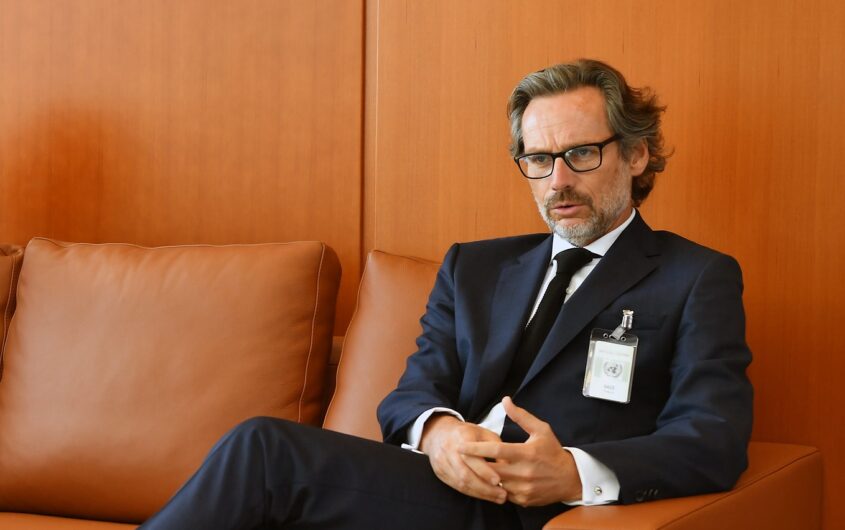
IAEA Imagebank via Flickr The original image has been cropped.
AGI Profiles: Jens Plötner

Jakob Grein
Georgetown University
Jakob Grein formerly worked at the European Commission’s Climate, Infrastructure and Environment Executive Agency (CINEA) and was a Halle Foundation intern the American-German Institute. He is currently a Graduate Student in Security Studies at Georgetown University where he focuses on European security and energy security.
Foreign and Security Policy Advisor to Chancellor Olaf Scholz
Jens Plötner was appointed Foreign and Security Policy Advisor to Olaf Scholz in December 2021. His official title is Ministerial Director, akin to an American Undersecretary, for Section 2 in the Chancellery, which is responsible for foreign, security, and development policy. Plötner transferred into the leadership team of Scholz from the German Foreign Office, where he had served as the political director since April 2019. Plötner is a seasoned diplomat with ambassadorial and administrative experience. He has served in a variety of roles in Berlin and abroad.
Background and Education
Born 1967 in Eutin, Eastern Holstein, Mr. Plötner began his education at the University of Hamburg, where he studied law. He also studied at the Université Bordeaux as well as the Université Paris 1 Panthéon-Sorbonne, from which he graduated with a Maîtrise in Public and International Law. He also studied political science at Sciences Po. This education prepared him for a career at the German Foreign Office. He joined in 1994, with his first duty station being Deputy Chief of Staff to the State Secretary (Parliamentary State Secretary in the Foreign Office). In the years that followed, he served in a variety of positions both at the Werderscher Markt (the colloquial name for the German Foreign Office headquarters in Berlin) and abroad in embassies. Notable postings include the political section of the German embassy to Israel from 1998-2002 and as Deputy Chief of Staff to the then-Foreign Minister and current President of Germany Frank-Walter Steinmeier from 2007 to 2008. Plötner served as the German Ambassador to Sri Lanka from 2009 to 2012, to Tunisia from 2012 to 2014, and to Greece from 2017 to 2019. Following his posting in Athens, he returned to Berlin as the political director of the Foreign Office. He served under Foreign Minister Heiko Maas, predecessor of the current Minister Annalena Baerbock.
Influence on Foreign Policy
When Plötner was called to the Chancellery in 2021, he was appointed by a chancellor who was not particularly well-versed in foreign policy. Scholz up to that point had been Minister of Finance and Minister of Labor. He was then, and maybe still is, focused on domestic politics. Plötner was brought on to fill this gap and become the foreign and security policy brain of the chancellor. And Plötner is well equipped to do just that, not only because of his education and career, but also because of his excellent connections. He is on a first-name basis with the diplomatic advisor of President Macron, Emmanuel Bonne, as well as Jake Sullivan, U.S. national security advisor. Plötner has been extraordinarily influential in German foreign policy, not just since his appointment as advisor to the chancellor. For example, he was involved in the 2015 Minsk negotiations which sought to end the war in Donbas and ultimately produced a ceasefire agreement between Russia and Ukraine. More recently, he has also reinforced Scholz’ position not to supply Taurus cruise missiles—which could be used to strike targets deep inside Russia—to Ukraine.
Plötner’s influence is not without its critics. Members of the Green Party have criticized Plötner for overstepping and meddling with the affairs of the Foreign Office. The Foreign Office’s head, Annalena Baerbock is also a member of the Greens, so these criticisms may be embedded in broader frictions between the coalition partners. In a similar vein, there have been not-so-smooth interactions between Plötner and members of the third coalition partner, the Liberal Party (FDP). Some have described Plötner as haughty and arrogant, which other parliamentarians have dismissed as Plötner simply being good at his job. While these squabbles may be symptoms of interpersonal disagreement, there is a more serious side to the criticism leveled against Plötner.
Some have associated the diplomat with the camp of the Russlandversteher, or Russia-sympathizers. In Germany, this term is used to describe politicians and other people who argue that Russia’s spheres of influence must be respected and that intensified economic intertwinement with Russia and the West will eventually turn Moscow into a democratic force. The Neue Ostpolitik, pursued by Chancellor Willy Brandt and his close confidante Egon Bahr, forms part of the foundation for this political approach. It is guided by the motto: Wandel durch Annäherung (change through rapprochement). The two former politicians, both Social Democrats, imprinted their way of thinking on successive generations of Social Democrats in Germany. To this day, this perspective, which evolved into a doctrine of Wandel durch Handel (change through trade), is particularly prevalent in the Social Democratic Party of Germany (SPD). It has been heavily criticized, as this economic entanglement has afforded Russia economic leverage, which it has utilized against Europe in the context of the full-scale invasion of 2022. Critics have also pointed out that the Russlandversteher were, and are, overly optimistic about Vladimir Putin and his neo-imperial ambitions of Putin and were over-reliant on diplomacy. In fairness, it must be mentioned that this is not exclusively a Social-Democratic issue. Former chancellor Angela Merkel has also been criticized for a foreign policy reminiscent of appeasement. After all, the construction of Nord Stream 2 began under her tenure as chancellor, and she oversaw the negotiation of the Minsk Accords.
One notable representative of an SPD Russlandversteher is Frank-Walter Steinmeier, who Plötner worked for early in his career. It is critical to note here that Plötner explicitly conceives of himself as a diplomat and not a political actor. It would be unfounded conjecture to argue that his proximity to prominent actors in the Social Democratic Party automatically led to Plötner adopting their political views. Despite working so closely with SPD officials, Plötner made an explicit point of never joining a political party himself. However, his approach to foreign and security policy, specifically vis-à-vis Russia, does bear resemblance to the cautious, diplomacy-first perspective which has overdetermined Germany’s policy toward Russia for decades.
In Berlin’s political circles, Plötner is also regarded as someone who is reinforcing the German chancellor’s reserved and restrained attitude toward arms deliveries to Ukraine. A telling episode occurred on June 20, 2022, at an event of the Berlin-based think tank German Society for Foreign Policy (DGAP). In response to a question about the EU accession of Ukraine, Plötner replied that just because a country is being attacked, it does not turn into a more lawful state. He also insisted that there must be room for evaluating the future relationship with Russia. Noah Barkin, who reported on this event, labeled it a rather tone-deaf response and indicative of precisely the mindset of the Russia-empathizers, which has been called into serious question by the inhumane and illegal invasion of Ukraine by Russian forces. Marie-Agnes Strack-Zimmermann, defense spokesperson for the Liberal Party, echoed this sentiment and wrote that these “statements […] reveal a way of thinking, which, over the last decades has gotten [Germany] into this terrible situation.” These comments, for some indicative of an outdated foreign policy approach to Russia, have led to significant pushback. This pushback is part of a more substantial criticism of Scholz’s hesitancy in supporting Ukraine, as for example voiced by then Ambassador of Ukraine to Germany, Andrij Melnyk. In response to these critical comments, the normally clandestine diplomat has, in an unusually public move, sought to dispel these criticisms and reinforce the image that he is an apolitical diplomat and advisor to the German chancellor.
Conclusion
Jens Plötner is an expert in foreign policy and a career diplomat. His impressive education and career gave him the necessary tools and personal connections to serve as the foreign policy advisor to Chancellor Scholz. He has been instrumental in shaping Germany’s foreign policy in a time when it has been challenged like never before. The COVID-19 pandemic, the war in Ukraine, the ensuing energy crisis, the ascendancy of China, the conflict between Israel and Hamas, as well as climate change and other global issues have put Germany to an unparalleled test. Jens Plötner is a vital—albeit not uncontroversial—part of the machine which responds to those challenges.








